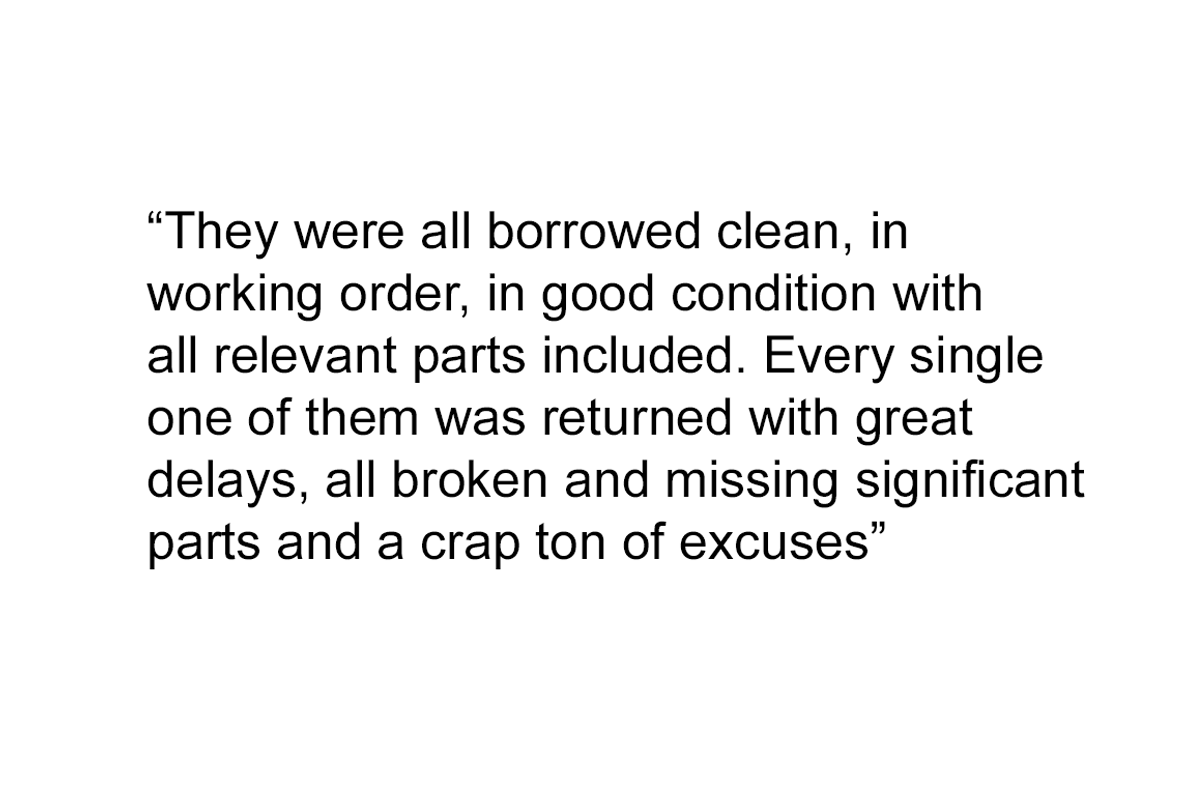
“She Expected An Inheritance From My Late Husband”: Widow Is Stunned By The Audacity Of One Woman, Gives Her What She Asked For In Petty Revenge
Interview With AuthorThe sad reality is that you don’t truly see what someone’s like unless they think there’s a lot of money up for grabs. If someone believes they might be able to get rich off an inheritance, you might just get a glimpse into their true character. Now, some people might surprise you with their kindness, restraint, and empathy. Others, however, are too greedy for their own good.
Redditor u/MorriganNiConn, whose husband passed away two years ago, shared a story with the r/pettyrevenge online community about her good friend’s daughter, ‘Kiki,’ who started talking about her ‘promised’ inheritance. The OP knew that her late husband didn’t leave Kiki anything, so she came up with a plan to get back at her. You’ll find the full story as you scroll down.
We got in touch with u/MorriganNiConn, and she was kind enough to answer our questions about what happened. “I was a mix of pissed and amused,” she told Bored Panda how she reacted upon hearing Kiki’s talking about ‘her’ inheritance. “I’ve known Kiki as long as I’ve been friends with her mom, so I’ve seen her go from a promising young girl to a grown woman who has burned bridges with most of the people in her life since her early 20s. After nearly 17 years of estrangement, it is only in the last year that she has begun reconnecting with her mom, who doesn’t trust her for a minute.” Read on for the full interview.
Unfortunately, some people feel like they’re entitled to someone’s inheritance and even lie to further their goals
Image credits: Los Muertos Crew (not the actual photo)
A woman went on the internet to share how she taught her friend’s daughter, who used to help her late husband at work, an important lesson
Image credits: Anastasia Shuraeva (not the actual photo)
Image credits: u/MorriganNiConn
The friend’s daughter quickly realized that she had messed up
“I told Kiki that I knew damned well that my husband had never promised her anything, much less an inheritance, BUT that there was some stuff he’d held onto that I thought would be the perfect reminder of the period in which he’d tried to mentor her before she burned her bridges with him!” redditor u/MorriganNiConn shared with Bored Panda what had happened.
“She was a little excited until she saw the pile of stuff me and her mom unloaded. I reminded her that Jim had loaned them all in good order to her and she was getting them back in the exact condition she returned them. It was up to her to make them useful again or not. Not my responsiblity, I was giving them to her freely.”
We were curious whether the redditor thought that her friend’s daughter had finally learned her lesson after what happened. “Do I think Kiki learned her lesson? Not really. And at her age, now, it is not my responsibility nor is it her mom’s responsibility,” she said.
The redditor shared some advice for family members and friends that could help them support someone who is grieving for a lost loved one. Something to avoid doing is repeating empty platitudes, as well as encouraging them to ‘move on.’ Meanwhile, you should strive to include the grieving person in social gatherings, and not be afraid to share good memories of the dead person as time goes by.
“Do not utter all those platitudes about the dead person being in a better place, that their suffering is done, that they’re with Jesus now (you don’t know what their beliefs were or not), etc. Sometimes, what we need is for those who would comfort us is to simply be with us. Sit with us. Pass the tissue box. Hold our hand. And be silent. And that is hard, but it is infinitely kinder than hearing some trite platitude,” u/MorriganNiConn said.
“Do generously share your memories of your friendship, relationship, work anecdotes, etc., of the dead person and not only in the days or weeks after they’ve died, but in the months and years that follow,” she told Bored Panda.
Image credits: Priscilla Du Preez (not the actual photo)
“Do not encourage the surviving spouse/partner to ‘move on.’ There is no erasing that person from our lives. We move forward and we grow around our grief, but the impact of our loved one in our life is always going to be with us. Expect that even when the survivors are doing good, they will still have moments that bring up sad feelings or longings for that person. And don’t infantilize or try to correct them for it. Grief is natural and a part of life.”
Meanwhile, family and friends should do their best to include the grieving person in what’s happening. “Invite them for local holidays and family gatherings where there are light-hearted things going on. Don’t judge them negatively if they decline, but be happy—and let them know you’re happy—when they accept and show up!”
She added that people have to accept that in the first few months, the grieving person might not know what they really need or want. “It takes a while to sort that stuff out mentally and emotionally.”
The redditor accomplished two things at the same time. First of all, by giving her friend’s daughter back all of the tools and items that she’d broken while helping her late husband with his work, she taught her some humility.
And, secondly, she managed to clear out some space in the tool shed. It was an incredibly graceful way to deal out a dash of revenge. Many people who read the story were incredibly supportive of the OP. They thought that she was very clever in how she handled the entire situation.
Practicing gratitude can help rein in greed and entitlement
Unfortunately, ‘Kiki’ is far from the only person eyeing up someone else’s riches. It’s something that many people do.
Personal finance expert Sam Dogen, the author of ‘Buy This, Not That,’ previously explained to Bored Panda that it’s a deep sense of entitlement and a lack of gratitude that makes people behave this way.
“It’s the sense of entitlement people have for other people’s money. The more entitled you feel, the worse you will act if you don’t get what you want,” he told us during an earlier interview.
“If you’re going into a will reading expecting anything more than nothing, you’ve already got ill intentions. It’s best to expect nothing. This way, if you get anything, it’s an upside. And if you get nothing, you won’t be disappointed,” the expert said.
“Self-interest is good for your survival and your family’s survival. But once you start expecting more at the expense of another, your greed may ruin your relationships with others,” he pointed out.
“To keep envy in check, always go through the things you already have and be thankful. Instead of always comparing up, compare sideways or down. Think back to the difficult times you encountered and appreciate where you are today,” he noted that gratitude is a very powerful thing that helps keep greed and envy in check.
Grieving is a very unique thing, and everyone goes through it differently
Image credits: Julia Taubitz (not the actual photo)
Losing a loved one is incredibly painful. Family members, friends, and coworkers will naturally want to support you in your time of need, however, they might not know how to do that. It’s important to remember that everyone grieves differently.
“Some grieve with a lot of crying and others grieve with being practical, and anything else in between. Not seeing any tears does not mean that people are not grieving. The process lasts as long as it needs to last, there is no time limit,” psychotherapist Silva Neves explained to Bored Panda during an earlier interview.
“Usually, grieving diminishes over time, which means that people become less and less upset over time, but some people will never ‘recover’ from grieving, especially those who lost a very important person. Most people learn to live with grief and sadness. Significant dates, such as anniversaries, may always be painful,” he said.
“Although there is some common knowledge about grief, such as ‘stages of grief’, a lot of people don’t follow ‘stages’ of grief because grief can be messy and unpredictable. The best way to support someone who is grieving is by sitting with them, listening to them and that’s it,” the expert said.
“It is also important not to tell people ‘I know how you feel’ because grieving is so unique, nobody can know what another person’s grieving feels like, but perhaps we can imagine how painful it is. A lot of people get a lot of support with grief at the beginning of the loss, but often people stop talking about after a while,” he pointed out to us.
“Grieving people usually do appreciate their friends asking about it, even a year later or two years later. Don’t be afraid to ask the question, ‘How are you?’ and allow the grieving person to speak. Ask them for what they need but don’t assume what they need. Sometimes a grieving person might need a hug, but sometimes they may need to sit in silence. Sometimes they may need to be distracted with something else, other times they may want to talk about their pain.”
The woman shared some more context in the comments of her post
Many readers were incredibly supportive of the author. Here’s what some of them said
I love the fact Kiki's mum helped the OP deliver all the broken c**p to her own daughter
For anyone unfamiliar with the term a "spendthrift trust" (what Kiki is going to get from her mother's will) controls when and how much the beneficiary gets from their inheritance - in other words, Kiki is getting her inheritance in bitesized amounts so any future spending spree is going to be severely curtailed.
Yep. Sadly, I think Ami knows full well her daughter would like die of an overdose if she had a large chunk of cash at her disposal. Drugs aren't mentioned, but Kiki's behavior is classic addict stuff.
Load More Replies...Omg, I feel like the freeing up of that much space with added benefit of petty revenge would be so healing. A bit of a new start.
Right on. Plus you no longer have to look at that broken stuff in your shed, which might trigger some people. It of sight, out of mind, you can let go of those feelings.
Load More Replies...I love the fact Kiki's mum helped the OP deliver all the broken c**p to her own daughter
For anyone unfamiliar with the term a "spendthrift trust" (what Kiki is going to get from her mother's will) controls when and how much the beneficiary gets from their inheritance - in other words, Kiki is getting her inheritance in bitesized amounts so any future spending spree is going to be severely curtailed.
Yep. Sadly, I think Ami knows full well her daughter would like die of an overdose if she had a large chunk of cash at her disposal. Drugs aren't mentioned, but Kiki's behavior is classic addict stuff.
Load More Replies...Omg, I feel like the freeing up of that much space with added benefit of petty revenge would be so healing. A bit of a new start.
Right on. Plus you no longer have to look at that broken stuff in your shed, which might trigger some people. It of sight, out of mind, you can let go of those feelings.
Load More Replies...
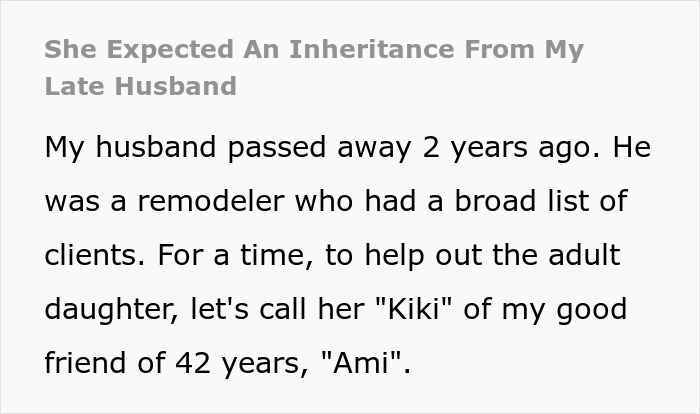


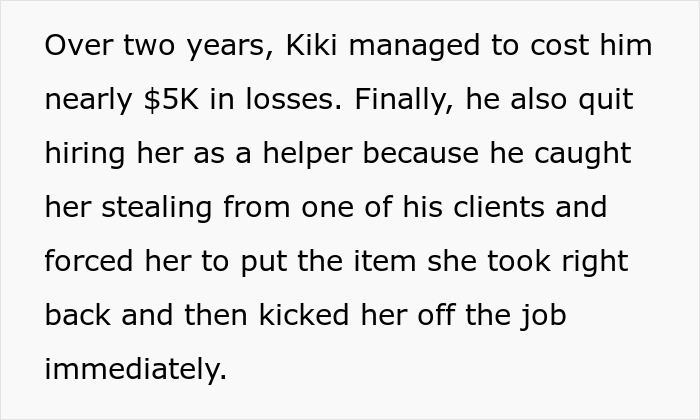


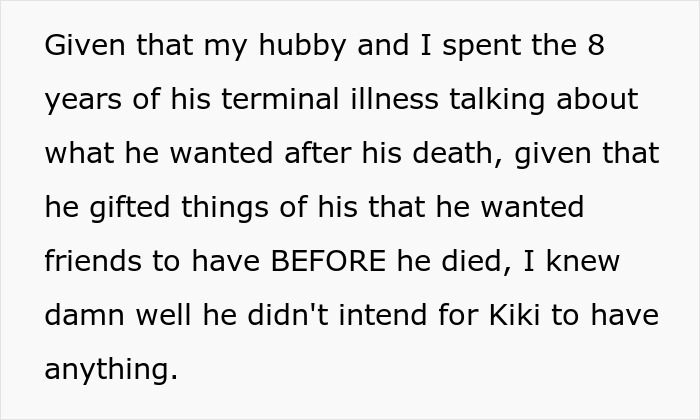

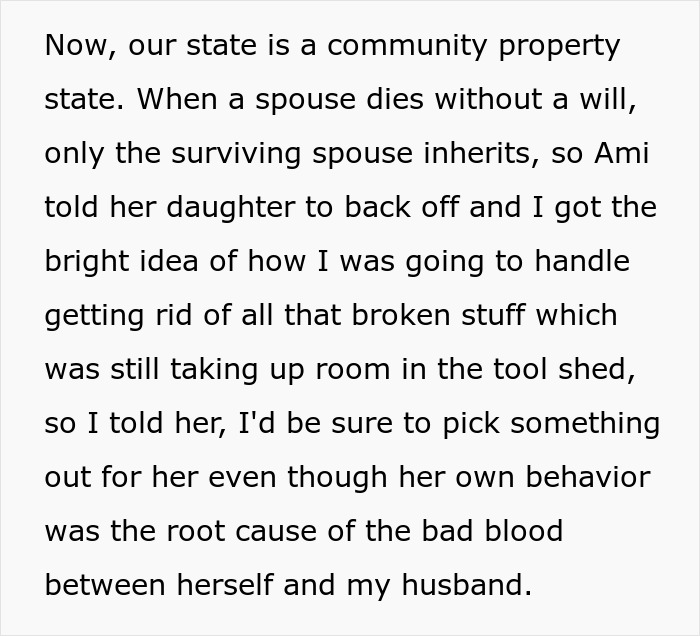
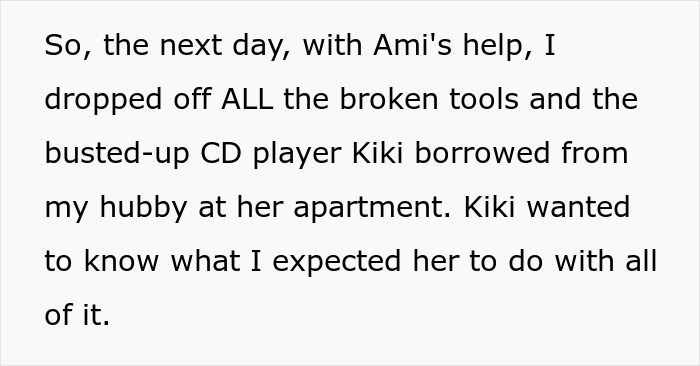
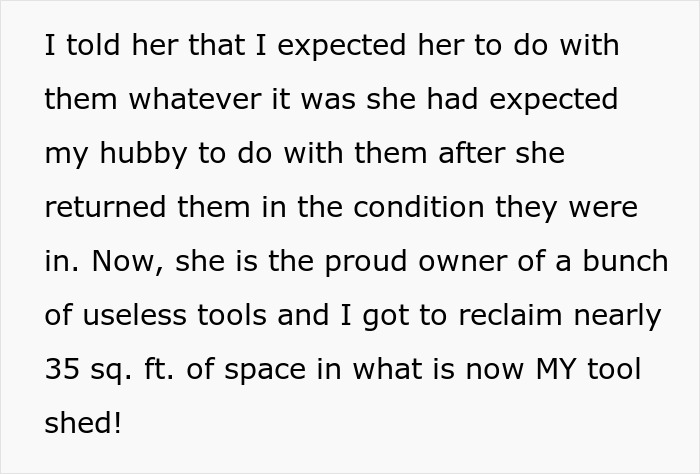
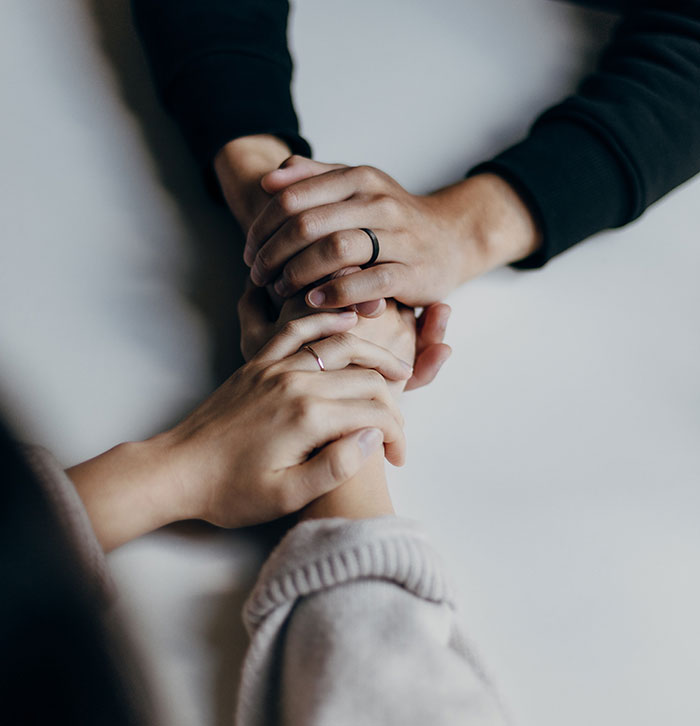






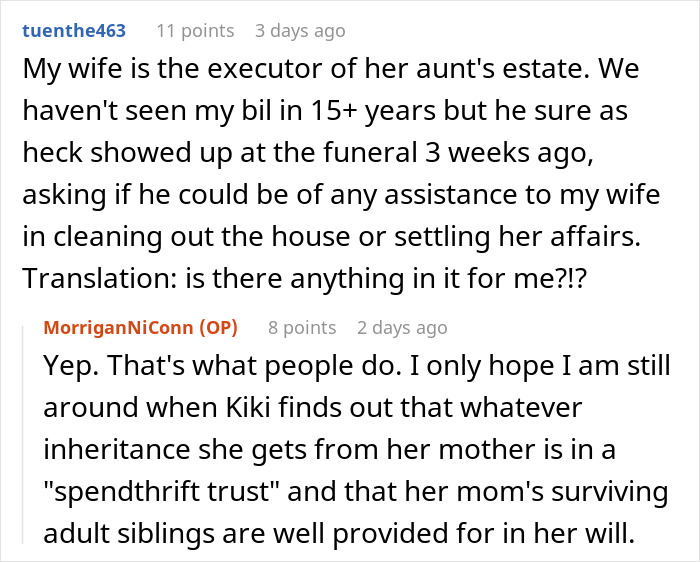













160
32